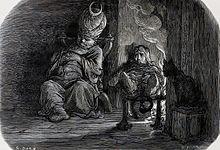
Panurge (from Greek: πανοῦργος / panoûrgos meaning "knave, rogue") is one of the principal characters in Gargantua and Pantagruel, a series of five novels by François Rabelais. Especially important in the third and fourth books, he is an exceedingly crafty knave, libertine, and coward.[1]
In Chapter 9 of the first book he shows he can speak many languages (German, Italian, Scottish, Dutch, Spanish, Danish, Hebrew, Greek, Latin and French), including some of the first examples of a constructed language.
In French, reference to Panurge occurs in the phrase mouton de Panurge, which describes an individual that will blindly follow others regardless of the consequences. This, after a story in which Panurge buys a sheep from the merchant Dindenault and then, as a revenge for being overcharged, throws the sheep into the sea. The rest of the sheep in the herd follow the first over the side of the boat, in spite of the best efforts of the shepherd.
Suddenly, I do not know how, it happened, I did not have time to think, Panurge, without another word, threw his sheep, crying and bleating, into the sea. All the other sheep, crying and bleating in the same intonation, started to throw themselves in the sea after it, all in a line. The herd was such that once one jumped, so jumped its companions. It was not possible to stop them, as you know, with sheep, it's natural to always follow the first one, wherever it may go.
— Francois Rabelais, Quart Livre, chapter VIII
Other uses
- Panurge is also the title of an opera by Jules Massenet, based on the character.
- Panurge is an alternative electronica trio from Vancouver, British Columbia
- "The Advent of Panurge" is a song by Gentle Giant.
- "Le mouton de Panurge" is a song by Georges Brassens (1964).
- Les Moutons de Panurge is a piece by composer Frederic Rzewski (1969).
References
- ^
 One or more of the preceding sentences incorporates text from a publication now in the public domain: Wood, James, ed. (1907). "Panurge". The Nuttall Encyclopædia. London and New York: Frederick Warne.
One or more of the preceding sentences incorporates text from a publication now in the public domain: Wood, James, ed. (1907). "Panurge". The Nuttall Encyclopædia. London and New York: Frederick Warne.